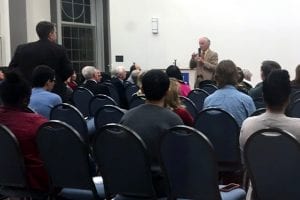
Tower Center-Asian Studies program Feb. 8.
The SMU Tower Center and Asian Studies hosted Perry Link, author and translator of many influential works on Chinese language, literature, human rights and cultural history, at SMU Feb. 8 for the program “The Life and Ideas of Liu Xiaobo.” Liu Xiaobo was China’s Nobel Peace Prize laureate before he died in July while still serving a prison sentence for inciting subversion of the state. He was an outspoken critic of both the West and China, a poet, and a scholar. HCM Tower Scholar Destiny Rose Murphy interviewed Link about his research into Xiaobo’s life before the program.
You have faced some official backlash from the Chinese government because of your work. Can you talk about that backlash and its impact on you?
I’ve been on a blacklist for travel to China since 1996. Would I rather not be on a blacklist? Yes, of course, but there are both advantages and disadvantages to being on a blacklist. The disadvantage of course is that I can’t go there. I can’t walk down the alleyways and eat the treats on the street and I can’t talk to my friends face to face. Another big disadvantage is that I’ve become unwittingly the tool of the Chinese state because I’m well known enough in the field that young scholars look at my example and they get afraid and censor themselves because they see the example of being blacklisted. And that galls me inside, but there’s nothing I can do about it.
But, I also get credit from people. People credit me with moral fiber and backbone and these things that I don’t really feel I have. I stumbled onto the black list just because I did some very ordinary things. Another advantage is that a lot of China scholars write and teach with the blacklist in mind, that is: do I dare say this, or will that get me on the blacklist? But once you’re on a blacklist that threat goes away, so you’re actually freer to say what you think and analyze as you choose. There’s a Chinese farmer’s proverb that says, “Dead pigs aren’t afraid of hot water.” So, I find when the press calls me out for interviews and stuff that I can speak more freely than a lot of my colleagues because of that.
Liu Xiaobo also faced official backlash for his work, ultimately resulting in the prison sentence that he was serving when he died. Do you think he could have taken a different path to avoid those harsh consequences?
He constitutionally couldn’t do that. I’m sure if he were here to answer your question he would say, “It wasn’t a conscious choice for me.” I’m working on his biography now and studying his character even as a primary school student. He’s been through all kinds of ups and downs and he went through a couple of periods that weren’t very admirable, to be frank about it, but one thing he never has changed is that he says what he thinks. To his parents when he’s little, to his teacher, to his friends, to the Chinese government, to Westerners, doesn’t matter. He doesn’t have that social filter that most of us have. So, when it comes to addressing problems in Chinese society and politics he writes what he thinks and says what he thinks and takes the consequences. It’s as if he doesn’t even anticipate the consequences.
What do you think students should learn from the life and style of Liu Xiaobo?
I admire his honesty. As you just pointed out in your earlier question, though, it brings penalties, and it feels wrong for a teacher in my role to advise students to go ruin their futures by getting punished. So, it’s hard to give that kind of advice, but I like to say to students: “We only live once, at least some of us think that, and what are you going to do? You might as well do what you really believe in.” This is what Liu Xiaobo did. He changed over the years what he believed in, but he was always honest, and he always went and did it. It wasn’t just that he said. He did what he thought was right, and that’s very admirable.
You have translated a great many Chinese literary works. If you could encourage students to read at least one of those works, which would it be and why?
I love to recommend to students the autobiography of this astrophysicist, Fang Lizhi. It’s called, in English, “The Most Wanted Man in China.” The book agent gave it that kind of flashy title. But, it’s not just about his political squabbles. It’s a very well written social history of China from the late 30s until the late 80s. You don’t think, at least I don’t, that scientists are necessarily the best writers, but his essays are just gorgeous.
He can evoke what life was like when he was a toddler, and then going to school under the Japanese, and, when the Communist revolution came, being very excited and positive and throwing himself into the Communist movement. And then getting bam, bam, bam hit down by the political campaigns that came in the 50s. And eventually deciding enough of this I’m gonna do the Liu Xiaobo thing–I’m going to say what I think, and then he gets in trouble. Really he’s just a very good writer. It was fun to translate him because he’s such a clever writer. It’s a great book for understanding modern Chinese history.